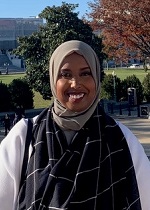 |
|
|
|
|
“I am Assistant Manager of the JOLTS Data Collection Center at the Bureau of Labor Statistics, which has allowed me to be on the frontlines of data collection and discover new ways to expand different modes and tools related to collecting high quality data. In the future, I hope to work more on improving survey processes and finding ways to reduce respondent burden.
In the midst of a global pandemic, it is even more pertinent to connect with others and discuss ways to adapt to unpredictable conditions. I hope to expand my network by attending NABE conferences and meeting members that are experiencing similar challenges in the field as well as discuss ways to overcome roadblocks we all may be encountering."
Safia Abdirizak, Bureau of Labor Statistics
|
| |
|
|
|
|
|
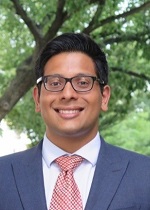 |
|
|
|
|
“All three of my siblings trained to be physicians. Despite expectations that I follow the same path, I graduated from Yale University with two Bachelor’s degrees in Economics and Global Affairs. After graduating, I spent two years at NERA Economic Consulting conducting economic analysis for securities class action and international arbitration litigations. Recently, I moved to the Postal Regulatory Commission as a data analyst. My hope in transitioning to the public sector is to apply my econometric training to improve the lives of people through public policy.
Attending NABE conferences and connecting with NABE members will directly help me achieve my goals. First-generation economists like myself do not have connections in the governing economic institutions of this country, and so attending these events allows me to meet policy economists at federal, state, and nonprofit organizations that I am interested in joining and/or working with.”
Philip Abraham, Postal Regulatory Commission
|
| |
|
|
|
|
|
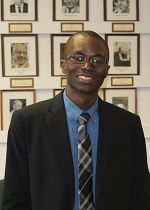 |
|
|
|
|
“I am originally from Africa, Ghana. I have a Master of Arts degree in economics from Kansas State University. I worked as an adjunct professor of economics for Columbus State Community College (in Columbus, Ohio) from August 2017 to July 2018. In August 2020, I joined the Bureau of Labor Statistics as an economist. I analyze employment, hours, and earnings estimates with respect to recent trends. Also, I present monthly estimates to BLS managers, including the BLS Commissioner.
I aspire to learn and advance my knowledge in applied economics in ways that will be useful to the public. Attending NABE conferences will enlighten me more on economic statistics and provide a chance to connect with other leading business economists and scholars as role models to aid in my professional development."
Osman Alhassan, Bureau of Labor Statistics |
| |
|
|
|
|
|
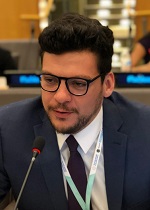 |
|
|
|
|
"I came to the U.S. five years ago due to the impeachment process in Brazil at the time. I was very frustrated with everything that was happening down there at the time and wanted to get a new perspective and understand in reality how economics works. After a few years learning English working as in the restaurant industry, I finally got accepted into my master’s program in Economics, working full-time and studying at the same time.
Looking at the future, I want to work and understand more about ML/behavioral methods to apply them to political economy and help to increase accountability in the public sector. NABE could help me to connect with people already working in the industry such as experienced economists, data scientists, and researchers.”
Marcelo Barroso, Aguilas
|
| |
|
|
|
|
|
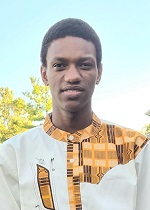 |
|
|
|
|
“I received my bachelor's degree in my home country of Burkina Faso. I wanted to widen my network, make new relations, improve my knowledge, and have an open mind to the world. So I asked my parents to support my continued studies in the U.S. They were favorable to that proposition, and thankfully, I am here. My career goal, before anything, is to obtain a PhD in applied economics, in order to be a great contributor to the development of Africa and the world.
Connecting to NABE members will allow me to widen my network and open a lot of opportunities for me, in the U.S. and the world. I am always thirsty to learn more. Attending NABE's conferences will make me richer in knowledge and experiences.”
Antar Yasser Diallo, Boston College
|
|
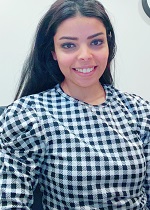
|
|
|
|
|
"I received my bachelor’s degree in economics and political science in Egypt, after which, I spent seven years working for foreign governments (Embassy of Serbia in Cairo and the Embassy of the Republic of Malawi). I moved to the U.S. in 2019 to pursue my master’s degree in applied economics at the University of Maryland.
I’m very passionate about being an economist, and I believe that attending NABE conferences and meeting NABE members will deepen my knowledge and enhance my future career. After completing my master’s, I hope to continue my studies in a PhD program and eventually work for an organization focused on economic and monetary policy development in the U.S. and globally.”
Hidee El-Rai, University of Maryland
|
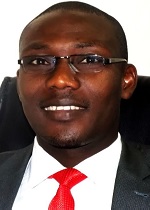 |
|
|
|
|
“It is no longer news that sustainable human developments are threatened by a myriad of natural and man-made risks. Amongst them, war, health, climate, biological, technological, and other economic risks are becoming increasingly harmful. For millions of people across the world, these risks mean more intense economic hardship and vulnerability.
While working with the United Nations World Food Programme, KPMG, Wood Mackenzie, and AFREXIM for over a decade and a half now, I have come to the realisation that the world needs research-based policies to address these hardships and vulnerabilities. Being able to contribute to those policies is my personal goal and aspiration. Being a member of NABE - a platform that provides access to valuable learning and networking opportunities for early-career minority economists, will afford me that opportunity to realise my goal and contribute to global peace and harmony."
Mutiu Olawunmi Fakorede, University of San Francisco
|
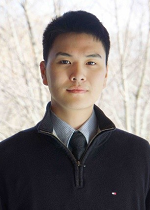 |
|
|
|
|
"After I was born in Texas, I lived between both the U.S. and China, spending most of my elementary school years in China and middle school in the Bay Area, after which I returned to China to finish high school. For the past five years, I have attended the University of Connecticut, completing my bachelor's degree in Economics, and currently pursuing a master's degree in Quantitative Economics.
As I progress through my master’s degree, I have come to realize how important networking is, as well as the importance of constant learning. I hope attending NABE conferences will help me network with real industry professionals as well as obtain new skills in preparation for the CBE exam. My career goal for the next five years would be to find a job in the financial industry, either working as a financial analyst or an economist/consultant, and to complete the CBE exam.
Alex Gu, University of Connecticut
|
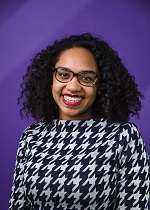 |
|
|
|
|
"For the past six years, I have been pursuing my Ph.D. in economics at the New School for Social Research. My academic research focuses on urban racial and economic inequality, gentrification, and family homelessness. Concurrently, I have worked in local government and non-profit organizations on commercial revitalization initiatives, including managing a federally funded grant program to support small businesses in low-income neighborhoods and assessing small business and resident needs.
Attending NABE’s conferences and connecting to NABE members would allow me to learn from premier economists and strengthen my ability to glean important data and policy insights and allow me to network with industry leaders and my professional peers, whose experiences can help inform my career plans and future job opportunities."
Danielle Kavanagh-Smith, The New School for Social Research
|
| |
|
|
|
|
|
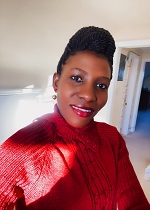 |
|
|
|
|
"I hold a Bachelor of Science in Quantitative Economics from Makerere University in Kampala, Uganda. I worked for FINCA bank in Uganda as an Account Relationship Officer and then Account Relationship Supervisor. In 2017, I relocated to the United States and started working with PNC Bank, where I was promoted to Branch Manager. In 2020, I started a masters in Applied Economics at the University of Maryland, and my goal is work as an economist in the next five years for the U.S. government. I would like to give back to the community as an economist. Attending NABE conferences is going to help me with networking and learning new ideas from experienced economists.
Doreen Nassali, University of Maryland |
| |
|
|
|
|
|
| |
|
|
|
|
|
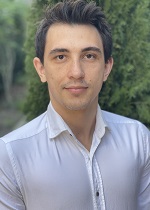 |
|
|
|
|
"After studying Electrical and Electronics Engineering with a minor in Economics at Bogazici University in Turkey, I realized that I was more interested in policy and decision making, so I switched my path to a Ph.D. in Economics at the University of Washington. Currently, I am a third-year Ph.D. student as an aspiring applied econometrician with a focus on Empirical Industrial Organization. NABE conferences and the NABE community provide invaluable networking opportunities in which I can meet with economists and have a more solid understanding of the problems and tools that they use. I believe being a part of the NABE community will enable me to improve substantially."
Yigit Okar, University of Washington |
| |
|
|
|
|
|
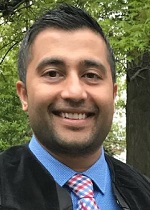
|
|
|
|
|
"After completing my Ph.D. in Economics from the University of Colorado, I took an Economist position with Southeast Toyota Finance. I have leveraged my education and training to work on projects from forecasting to demand modeling to optimization. The NABE conferences have several sessions of interest, but particularly for me are those related to my industry. I am hoping to learn how transportation policies and mortgage forbearance affect the auto loan industry, as well as network with fellow members and share insights/ideas."
Amit Patel, Southeast Toyota Finance
|
| |
|
|
|
|
|
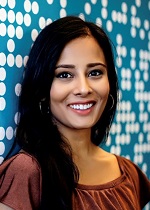 |
|
|
|
|
“I am a Bangladeshi-American, first-generation immigrant who has witnessed from an early age the crippling effects of poverty and inequality. Motivated by the struggles of my upbringing, I pursued economics as my field of study as an undergraduate at Boston University and subsequently as a Master’s student at the George Washington University. Currently, as an applied economics PhD student, I am researching the effects of U.S. policies governing high-skilled immigration on labor market and firm-financial outcomes. In addition, I am also working on a study evaluating the impact of private-sector summer employment on youth academic outcomes.
Among all the conferences I have had the opportunity to attend, I can say sincerely that the NABE events I attended over the years are the most impressive along all dimensions. They are intellectually stimulating, they provide me ample opportunity for valuable networking with industry leaders, and they help hone my technical skills.”
Urbashee Paul, Northeastern University |
| |
|
|
|
|
|
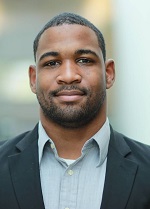 |
|
|
|
|
“After completing my undergraduate degree in Economics from the Pennsylvania State University, I worked in finance at the Vanguard Group. I have now been working as an economist at the Bureau of Labor Statistics for almost two years. In the next five years, I plan on finishing my Master's Degree in Economics at University of Missouri and hopefully advancing to a senior economist position in the government, after which I will work to have my research published by the BLS. Attending NABE conferences and connecting with members will help me reach my goals because I will have the opportunity to learn and meet other economists who have advanced in the field."
Marcus Polite, Bureau of Labor Statistics
|
| |
|
|
|
|
|
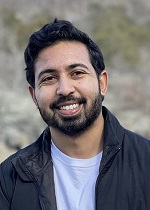
|
|
|
|
|
“I completed my Bachelors in Economics from India, and I am currently pursuing my Masters in Applied Economics from The George Washington University. In the future, upon graduating next year in May, I would want to enter the Economic Consulting field and work on dynamic projects that merge economic research and data analytics, primarily in the area of antitrust and competition practices in the economic field.
The NABE community is very diverse and provides its members with a network of experts in the field of business economics and economics in general. I hope to learn from their experience, their teachings and thought process, and internalize it throughout my academic and professional life.”
Suhaas Ramani, The George Washington University
|
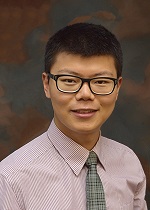 |
|
|
|
|
"In the past three years, I have been working as a labor economist analyzing micro-level economic datasets at the State of Utah. Meanwhile, being an adjunct professor, I am also proud to help my students at Salt Lake Community College to understand the world by applying economic concepts.
NABE conferences offer a great way for me to keep my knowledge up to date. With the help of the scholarship, I would like to continue connecting with fellow economists from all industries. Being involved in NABE activities will help me to better understand how we can apply economic knowledge as practitioners and what we can bring to the community."
Guowang (George) Rao, CBE, State of Utah |
| |
|
|
|
|
|
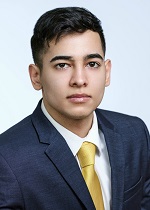 |
|
|
|
|
"I studied economics and math as an undergraduate and then went on to complete my master’s degree in Econometrics and Quantitative Economics. Currently, I work as a quantitative analyst for Truist Financial Corp. to develop and deploy econometric and macroeconomic models for the bank and work closely with the Federal Reserve Bank (FRB) and Federal Deposits Insurance Corporation (FDIC) to ensure the bank's adherence to Dodd-Frank Act Stress Tests (DFAST) requirements.
Attending NABE conferences will allow me to gain insights on economic topics and face realities which I do not encounter as part of my job on a daily basis but are really important to consider and understand. Moreover, meeting other NABE members who share the same passion towards economics and diversity as me will strengthen my belief in togetherness and develop me as a strong and inclusive professional."
Saannidhya Rawat, CBE, Truist Financial Corporation |
| |
|
|
|
|
|
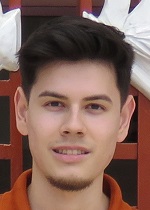 |
|
|
|
|
"It wasn't until my recruiting process was upended by the nationwide lockdown that I decided I would apply to graduate school. One reason for the hesitation was the fact that I had never met a Hispanic/Latino in the field of economics. Having the opportunity to connect with NABE professionals would, without a doubt, help me achieve my goals by giving me an opportunity to hear from a diverse group of people who work in the field, which I think is important to attract more diverse talent to the profession.
I think it is amazing that the NABE members are individuals who are studying the most important economic questions in the world, and I think that being a diversity scholar provides a great opportunity for me to have a front row seat in these discussions. I am looking forward to continuing being involved with NABE and learning as much as I can."
Edgar Reyes, The University of Texas at Arlington |
| |
|
|
|
|
|
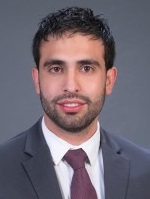 |
|
|
|
|
"The first major I selected when I started my studies was Political Science. Throughout my early years I wanted to devote my life to make a positive impact through policy. As my studies progressed, I realized that I would not be able to understand policy without measuring impact. Hence, I decided to get a second major in Economics. My curiosity for the science of measuring kept growing so I decided to pursue a Master's program in Applied Economics.
Throughout the next five years, I wish to expand my exposure to more projects. I want to learn how the science is implemented for business purposes and gain technical skills that keep evolving with the availability of data and computing power. I look forward to attending NABE conferences to learn new things that can be applied to my work, as well as to meet economists at different stages of their careers and expand my network. As an experienced consultant with diverse experiences, I believe I could also provide thoughtful insight to my colleagues at NABE."
Esteban Pabon Sainz, Summit Consulting LLC |
| |
|
|
|
|
|
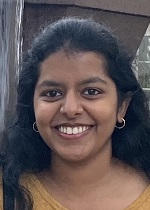 |
|
|
|
|
"I am a graduate student in Applied Economics aspiring to become a Data Scientist. I am now working on using machine learning trying to analyse Covid-19 vaccination behaviours in University Students.
Being a Diversity Scholar is going to help me attend the biggest congregation of economists and meet some of the greatest minds in the field, as well as potential employers."
Pallavi Aytha Swathi, University of San Francisco |